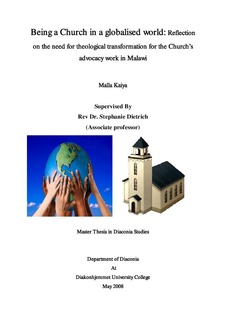| dc.description.abstract | This thesis has discussed, analyzed and explored the need for the Church in Malawi to address root causes of socio-economic injustice. The majority of people in Malawi are living beyond poverty line and the poverty level is being deepened as a result of economic injustices. The Church in Malawi, being one of the civil society institutions, stands in a strategic position to address injustice issues since it is able to work directly with people at grass root level. The thesis gave a background of the political and Socio-economic situation in Malawi and it analyzed and discussed the role of the Church over such issues. It has been noted that Socioeconomic injustice is a world wide problem. Globally, neo-liberal economic policies are bringing devastating impact in many developing countries. In case of Malawi, it has been noted that the impact of such policies are contributing to the worsening situation of vicious circle of poverty. An analysis of theological models which theologians follow when it comes to social issues shows that different ecclesiological understandings leads to denominations being involved in social issues differently. Even though the Church agrees in general for its need to be involved
in social issues, there have been some disagreements on its involvement when social issues especially when they are connected to political issues. The Church in Malawi has been responding to problems mostly on reactive level which has been beneficial to a lot of people. However, it has been argued that responding on reactive level only can not help people get out of vicious circle. Rather, the Church has to respond on proactive level as well; thus addressing
the root causes of social problems. It has been argued that in order for the Church in Malawi to be involved in Socio-economic
injustice issues it has to exercise its prophetic role that has a heart for the marginalized in the society like the poor, women, orphans and other groups with physical and mental challenges. As a way forward for the Church in Malawi, the thesis suggested the need for transformation, the need for ecumenical engagement at local, national and international level and the
integration of Socio-economic issues in its theological schools. | en |
